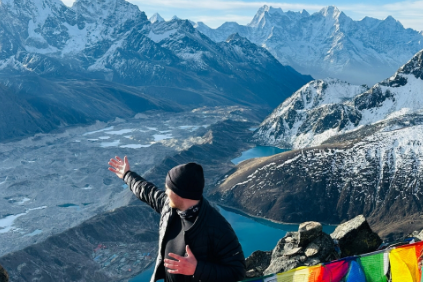How To Plan a Responsible and Eco-Friendly EBC Trek

The Everest Base Camp Trek is one of the great adventures of the world and a fantastic, rewarding time! Thousands and thousands of travelers aspire to take the adventurous EBC Hike and to follow the traditional Everest Base Camp Trek course each day. But the extraordinary achievement of the Mount Everest Base Camp excursion has positioned undue strain on the sensitive alpine surroundings and indigenous Sherpa groups. Whether or not you can call your EBC Trek journey a success at the end may come down to whether or not you arrive healthy and having treated everyone with the respect they deserve.
When considering the actual Cost to visit climb to Everest Base Camp, environmental purity and community backing should be added to the monetary cost of Everest Base Camp Trek Costs! This complete guide covers nine key considerations for a truly eco-friendly and responsible trek, guaranteeing your epic journey doesn’t warp the very beauty you travel halfway around the world to be old.
Selecting the Best Trekking Operator and Package
The right choice of company is the basis for a responsible Everest Base Camp Trek. A good operator will build sustainability into their business and show that they are doing more than chasing the bottom line of the Everest Base Camp Trek Cost.
Whilst choosing your Everest Base Camp Trek package, opt for companies that are open about their employment, as guides and porters receive fair wages, the necessary insurance, and adequate kit. Look for eco-conscious businesses such as those that pledge to follow a ‘carry-in, carry-out’ waste policy and back local clean-up projects. No matter what, you go for an Economy version or a high-end Luxury Everest Base Camp Trek, an investment in sustainability is non-negotiable and should be factored in with the quoted Hike to Everest Base Camp cost.
A Truly Sustainable Waste Management: The “Leave No Trace” Attitude
Waste, especially plastic, is one of the most severe environmental problems in Khumbu. Your personal dedication to responsible garbage disposal is the key to a successful Everest Base Camp Tour.
You have to adopt a rigorous “Leave No Trace” strategy, plan on taking all non-compostable rubbish back with you — plastic wrappers, batteries, and, believe it or not, toilet paper are rarely dealt with properly around there because of already-overworked local systems. Carry reusable containers and cloth bags for purchases and purify water so you don’t have to use single-use plastic bottles which have a disturbingly high Everest Base Camp trek cost on the environment. Responsible waste management, even if that means carrying trash down for days, is a step towards maintaining the untrampled environment of Everest Base Camp.
Use of Fuelwood and Firewood: Impact on the Treeline
Firewood consumption within teahouses is a main cause of deforestation in the Sagarmatha National Park, eroding the vitallow-altitude tree line. Responsible EBC Trekking involves being thoughtful about your energy use.
Choose to stay in teahouses that maintain alternative energy source systems for cooking and heating, such as kerosene, solar power, or eco-friendly biogas. If you buy a ‘fixed’ Everest Base Camp Trek, make sure that your operator is dedicated to using these responsible lodges. Also, try to restrict the use of hot showers, especially in higher elevations, where you may have to burn precious resources in order to heat your water for a shower. A little change in personal habits goes a long way when it comes to conservation, and the less impact we have on the Everest Base Camp, the Trek Price.
Respecting Local Culture and Communities
A responsible trek is not just an environmentalist thing, but a profound respect for the Sherpa culture and customs of the area. You deserve your Everest Base Camp Trek to be a gain, not a loss.
Ask permission before photographing people, and remember that some sites, es as monasteries or prayer areas, are sacred and should be treated with respect. Basic Nepali or Sherpa phrases, any phrases you can’t yet find in the guidebooks: A small greeting will suffice. Where you can, support local businesses and buy locally made souvenirs to make sure your holiday money really does go where it is needed, rather than outside interests.
Fair Treatment of Porters and Guides
The Sherpa people are the lifeblood of the Everest Base Camp Trek. And respecting their human rights is an essential principle of good tourism, whatever your Everest Base Camp Trek Cost.
If you employ a porter, check that they are not overloaded (the convention in the industry is for around 20-25 kg of weight) and have been adequately equipped with gear, appropriate footwear, and warm clothes. Absolutely make sure your trekking company provides its staff with insurance and medical cover. Fair salary and decent working conditions to work in are also aspects that should clearly be outlined within your Everest Base Camp Trek package contract.
Eating and Consuming with All Awareness
The further up you get on the Everest Base Camp Tour, the harder it is to find food and resources. Conscious consumption can reduce waste and preserve local resources.
Instead, order local dishes that could be refilled for little money, such as dal bhat — one of the more sustainable things to eat as a visitor to the local community — rather than asking for expensive dishes from abroad. Don’t eat meat, especially in upper Namche Bazaar, as it must be hauled to higher elevations and poor refrigeration makes it hazardous and requires additional resources to transport, which means more Hthe ike to reach Everest Base Camp.
Costs of tipping, permits, and other
Various charges help support the local infrastructure and conservation activities. Ensure your Everest Base Camp Trek Itinerary consists of fees for all required allows, together with the Sagarmatha National Park price and the neighborhood vicinity permit. These proceeds move into the financing of park maintenance, conservation efforts, and neighborhood government. Budget so that you can tip your guide and porter, a crucial custom and a large part of their income. Tipping is a straightforward way to say thank you for the service they provide and completes your overall Everest Basecamp Trek Price.
Participating in Conservation and Community Initiatives
Do your part to back local cleaning and sustaining projects. By Siobhan Clare Here’s one for the list. Your contribution (big or small) will give purpose and substance to your Mount Everest Base Camp Trek.
Ask if there are any local community projects like a school, health ppostsor reforestation project, that you can visit or support. Several environmentally sustainable Luxury Everest Base Camp Trek companies offer the opportunity to visit such projects. Even if only for a short time as part of an acclimatization hike, volunteering to pick up litter can help turn your personal journey into one of stewardship for the environment that you came and fell in love with.
So, in conclusion: A responsible Everest Base Camp Trek?
The EBC Trek trip is a privilege, not a right. The stunning scenery of the Himalayas, including along its ancient trails and peaks, is a heritage of the world and future generations. (jblu1 as Combined) Planning gripping, sustainable, and ecologically treks in the Khumbu involves much more than simply considering how you will be able to combat the inevitable challenges that trekking in this region entails. When you select an honest operator, have a good waste management practice in place, respect local culture, and treat your team fairly, then when taking up the Everest Base Camp T, out is more than just a personal feat. It is turned into a net good for the environment and the communities that have made the mountain their home. The REAL word for your EBC Trek experience is not found in the snaps u take back home, but the negligible FOOT PRINT you left behind. Pack well, leave only footprints, and may your path do the same.




